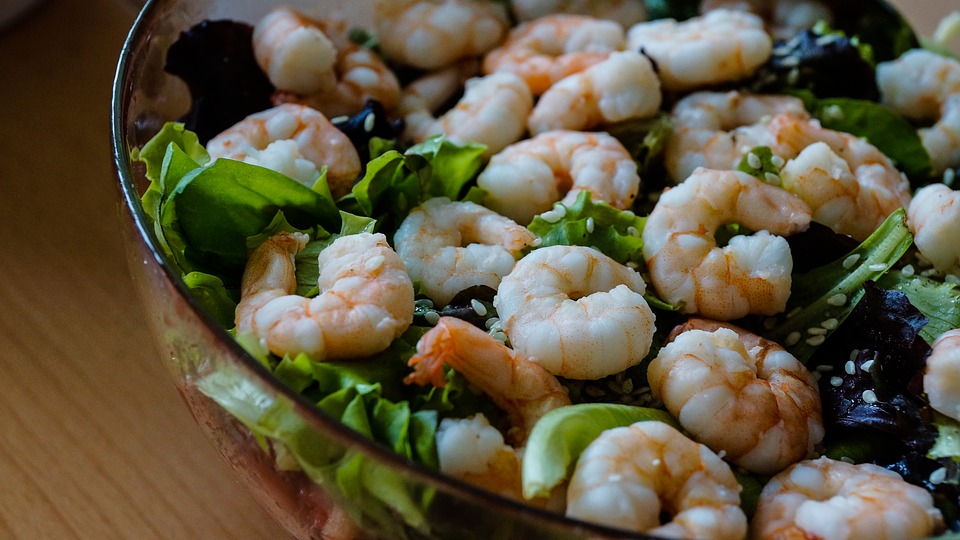This comprehensive guide dives into the world of shrimp and dogs, exploring the potential benefits and risks associated with feeding this seafood to your furry friend. We'll examine the nutritional value of shrimp, discuss safe preparation methods, and highlight the potential dangers, including allergies and parasites. We'll also address common concerns regarding shrimp consumption for dogs, offering expert advice and tackling frequently asked questions.
Part 1: The Nutritional Value of Shrimp

1.1 Protein Powerhouse:
Shrimp is a remarkable source of high-quality protein, essential for building and maintaining lean muscle mass in dogs. Unlike some other protein sources, the protein in shrimp is easily digestible, making it a suitable choice for dogs with sensitive stomachs.
1.2 Omega-3 Fatty Acids:
Shrimp is packed with omega-3 fatty acids, which contribute to a healthy coat, support cognitive function, and promote joint health. These essential fats can help alleviate inflammation and support healthy aging in dogs.
1.3 Vitamins and Minerals:
Beyond protein and omega-3s, shrimp boasts a spectrum of essential vitamins and minerals. This includes:
- Vitamin B12: Crucial for energy production and red blood cell formation. This vitamin can be particularly beneficial for older dogs who may experience a decline in B12 levels.
- Selenium: A powerful antioxidant that helps protect cells from damage. Selenium plays a vital role in maintaining a strong immune system.
- Zinc: Essential for immune function and wound healing. Zinc is particularly important for puppies and growing dogs, as it supports healthy development.
- Copper: Plays a role in red blood cell production and bone formation. Copper can help maintain healthy blood vessels and support heart function.
Part 2: Potential Risks of Feeding Shrimp to Dogs

2.1 Shell Allergies:
While shrimp offers nutritional benefits, some dogs are allergic to chitin, a substance found in the shrimp shell. This allergy can manifest as itching, hives, swelling, and digestive upset.
2.2 Shell Fragments:
Even a small shell fragment can pose a choking hazard for dogs, particularly smaller breeds. It's crucial to remove all shell fragments before feeding shrimp to your dog, regardless of size.
2.3 Sodium Content:
Shrimp can be high in sodium, which can be problematic for dogs with pre-existing heart or kidney conditions. Opt for low-sodium shrimp options or limit shrimp consumption for dogs with these conditions.
2.4 Parasites:
Raw or undercooked shrimp can harbor parasites that can cause illness in dogs. Always cook shrimp thoroughly to eliminate any potential parasites.
2.5 Food Poisoning:
Improperly handled shrimp can lead to food poisoning in dogs. Keep shrimp refrigerated and cook it promptly to prevent bacterial growth. Remember, always wash your hands thoroughly after handling raw shrimp.
Part 3: Safe Ways to Feed Shrimp to Dogs

3.1 Cooking Methods:
Thorough cooking is paramount when feeding shrimp to dogs. It kills parasites, softens the shell, and makes it easier for your dog to digest. Boiling, grilling, and baking are suitable methods. Avoid frying, as it adds unhealthy fats.
3.2 Shell Removal:
Meticulously remove all shell fragments before feeding shrimp to your dog. Even small pieces can pose a choking risk. Take your time and ensure no remnants remain.
3.3 Portion Control:
Shrimp should be treated as an occasional treat, not a regular part of your dog's diet. A small portion, equivalent to a few shrimp, is usually sufficient.
3.4 Introducing Shrimp Gradually:
When introducing shrimp for the first time, start with a minuscule amount and monitor your dog for any signs of allergic reactions. If your dog displays no adverse effects, you can gradually increase the portion size over a few days.
Part 4: Shrimp Allergies in Dogs
4.1 Symptoms of Shrimp Allergies:
Symptoms of shrimp allergies in dogs can vary but often include:
- Itching and Scratching: Excessive scratching, particularly around the ears, paws, and face.
- Hives or Welts: Raised bumps or welts on the skin, often accompanied by redness and swelling.
- Swelling of the Face, Lips, or Paws: Swelling that can be localized or more widespread.
- Vomiting or Diarrhoea: Gastrointestinal upset often related to the immune response to the allergen.
- Difficulty Breathing: In severe cases, an allergic reaction can cause respiratory distress.
4.2 Identifying the Cause:
If you suspect your dog has a shrimp allergy, consult your veterinarian. They can perform tests to confirm the allergy and provide appropriate treatment options, which may include medication or dietary changes.
4.3 Management of Allergies:
Avoid feeding shrimp to your dog if they have a confirmed allergy. There are many other seafood options, such as cooked salmon or tuna, that can be enjoyed in moderation as a treat.
Part 5: Common Concerns and FAQs
5.1 Can puppies eat shrimp?
It's best to avoid feeding shrimp to puppies until they are at least a year old. Their digestive systems are still developing and may have difficulty digesting shrimp, potentially leading to digestive upset.
5.2 Can I give my dog shrimp every day?
No, shrimp should be given as an occasional treat, not a regular part of your dog's diet. Too much shrimp can lead to an imbalance of nutrients and potential health issues.
5.3 How much shrimp can my dog eat?
A small portion, equivalent to a few shrimp, is usually sufficient. The amount will vary depending on your dog's size, but err on the side of caution and start with a small amount.
5.4 Can I feed my dog raw shrimp?
No, raw shrimp can contain parasites and bacteria that can harm your dog. Always cook shrimp thoroughly before feeding it to your dog to eliminate any potential health risks.
5.5 Is cooked shrimp safe for dogs?
Yes, cooked shrimp is generally safe for dogs if fed in moderation and without shells. However, it's crucial to consider potential allergies and sodium content.
5.6 What if my dog eats shrimp and has a reaction?
If your dog has an allergic reaction to shrimp, contact your veterinarian immediately. They can provide appropriate treatment and advice to address the reaction and prevent future complications.
Conclusion
While shrimp can be a nutritious and tasty treat for dogs when given safely, it's crucial to be mindful of the potential risks. By thoroughly cooking shrimp, removing shells, and feeding it in moderation, you can safely enjoy this seafood treat with your canine companion. If you have any concerns about feeding shrimp to your dog or suspect an allergy, consult your veterinarian for personalized advice.
Everyone is watching
-

Can Dogs Eat Bananas? A Guide to Safe Treats
DOGS & PUPPIESThis comprehensive guide will delve into the world of canine nutrition, focusing on the popular question: can ...
-

Can Dogs Eat Oranges? (Is It Safe or Toxic?)
DOGS & PUPPIESThis article delves into the question of whether dogs can safely consume oranges. We'll explore the nutrition...
-

Can Dogs Eat Grapes? The Shocking Truth About This Fruit
DOGS & PUPPIESThis article delves into the controversial topic of grapes and dogs, exploring the potential dangers associate...
-

Why Do Dogs Eat Poop? Understanding Coprophagia in Dogs
DOGS & PUPPIESThis article delves into the perplexing phenomenon of coprophagia, the act of eating faeces, in dogs. We explo...
-

Can Dogs Eat Shrimp? A Guide to Safety and Risks
DOGS & PUPPIESThis comprehensive guide dives into the world of shrimp and dogs, exploring the potential benefits and risks a...
